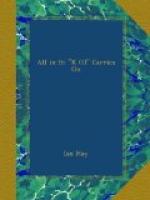“I admit to you,” continued Wagstaffe, “that when I found myself pitchforked into ‘K(1)’ at the outbreak of the war, instead of getting back to my old line battalion, I was a pretty sick man. I hated everybody. I was one of the old school—or liked to think I was—and the ways of the new school were not my ways. I hated the new officers. Some of them bullied the men; some of them allowed themselves to be bullied by N.C.O.’s. Some never gave or returned salutes, others went about saluting everybody. Some came into Mess in fancy dress of their own design, and elbowed senior officers off the hearthrug. I used to marvel at the Colonel’s patience with them. But many of them are dead now, Bobby, and they nearly all made good. Then the men! After ten years in the regular Army I hated them all—the way they lounged, the way they dressed, the way they sat, the way they spat. I wondered how I could ever go on living with them. And now—I find myself wondering how I am ever going to live without them. We shall not see their like again. The new lot—present lot—are splendid fellows. They are probably better soldiers. Certainly they are more uniformly trained. But there was a piquancy about our old scamps in ‘K(1)’ that was unique—priceless—something the world will never see again.”
“I don’t know,” said Bobby thoughtfully. “That Cockney regiment which lay beside us at Albert last summer was a pretty priceless lot. Do you remember a pair of fat fellows in their leading platoon? We called them Fortnum and Mason!”
“I do—particularly Fortnum. Go on!”
“Well, their bit of trench was being shelled one day, and Fortnum, who was in number one bay with five other men, kept shouting out to Mason, who was round a traverse and out of sight, to enquire how he was getting on. ‘Are you all right, Bill?’ ’Are you sure you’re all right, Bill?’ ‘Are you still all right, Bill?’ and so on. At last Bill, getting fed up with this unusual solicitude, yelled back: ‘What’s all the anxiety abaht, eh?’ And Fortnum put his head round the traverse and explained. ’We’re getting up a little sweepstake in our bay,’ he said, ’abaht the first casuality, and I’ve drawn you, ole son!’”
Wagstaffe chuckled.
“That must have been the regiment that had the historic poker party,” he said.
“What yarn was that?”
“I heard it from the Brigadier—four times, to be exact. Five men off duty were sitting in a dug-out playing poker. A gentleman named ’Erb had just gone to the limit on his hand, when a rifle-grenade came into the dug-out from somewhere and did him in. While they were waiting for the stretcher-bearers, one of the other players picked up ’Erb’s hand and examined it. Then he laid it down again, and said: ’It doesn’t matter, chaps. Poor ’Erb wouldn’t a made it, anyway. I ’ad four queens.’”
“Tommy has his own ideas of fun, I’ll admit,” said Bobby. “Do you remember those first trenches of ours at Festubert? There was a dead Frenchman buried in the parapet—you know how they used to bury people in those days?”




